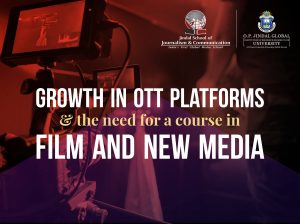With the dynamically changing finance industry, the Master of Business Administration degree is emerging as a promising career path for graduates who want to leave a mark in the marketing field and also have a great interest in economics, management, leadership, marketing, and statistics.
India has seen tremendous growth in the financial sector over the years. According to India Brand Equity Foundation, the banking sector leads, with retail banks having more than 64% of the asset provided by the financial system.
With such a change rate, India’s finance system has opened doors for graduates to explore and pursue their fields of interest. For example, large companies like Amazon and Google offer intriguing career roles in product design, product management, and reputation management, requiring a deep knowledge or understanding of finance.
What is an MBA in Digital Finance and Digital Banking?
An MBA in Digital Finance and Digital Banking contains specialised courses devoted to the areas of digital finance – such as cashless transactions, technical accounting systems, technological requirements for managing and executing securities transactions on domestic as well as international levels, creation of financial models using tools to come up with effective methods for managing mergers, etc. This programme will also help you understand banking basics, such as how regulatory policies affect a bank’s offerings and is especially suited for those interested in the booming field of digital banking and digital finance.
Scope of MBA in Digital Finance and Banking
There are ample opportunities for MBA freshers and professionals trained in digital finance and banking degrees. Their work field can vary from asset management to accounting and risk management. Below are some of the best career opportunities for an MBA in Digital Finance and an MBA in Digital Banking course.
Financial Analyst
Mostly Multinational Corporations (MNCs) need financial experts in economics, market, and accounting to perform economic forecasting and operational metrics tracking and provide strategies or plans to thrive in the market.
The primary job responsibilities are:
- Analyse economic data and create economic models for decision support
- Report on financial preparation and performance for regular leadership reviews
Investment Banker
An investment banker is liable for handling Initial public offering (IPOs) and identifying suitable mergers and acquisitions at a fair price and worth.
The world’s most prominent financial institutions like Morgan Stanley, Goldman Sachs, and many more hire knowledgeable or skilful investment bankers to manage the company-investors relationship.
The primary job responsibilities of an Investment Banker are:
- Conduct diligence studies
- Manage IPO
- Evaluate risk and provide financial advice on mergers and acquisitions, private or valuations equity transactions
- Complete reporting, forecasts and creation models
- Underwrite, analyse and close finance deals
- Negotiate and structure financial details
Risk Managers
The name has cleared everything by itself. However, you are responsible for anticipating any possible risks in the firm’s financial operation that can prove a threat to its safety, growth and integrity. In addition, such an individual is responsible for correcting losses and managing unpredictability incoming trends and cost-involvement in an organisation.
Venture Capital Analyst
An individual’s capital analyst job description includes being aware of the dynamic industry trends and keeping up with them, thus beating competitors. In addition, such professionals are solely responsible for networking and working with venture capital firms and identifying promising, creative start-ups needed in the market; by providing them capital for scaling their companies.
Portfolio Manager
As a portfolio manager, your primary responsibilities would be managing money in hedge funds that have pooled an enterprise’s money. In addition, you will need to continually explore the current market condition and help customers achieve their pre-set financial goals.
Some of the best job positions you can bag with your MBA degree in Digital Finance & Banking include Insurance & Risk Managers, Financial Analyst, Corporate Controllers, Personal Financial Advisor, Investment Banking Associates, etc.
In India, the best recruiters for MBAs in the BFSI sector are SBI, ICICI, HDFC, HSBC, Deutsche Bank, Citi Bank, Axis Bank, Yes Bank, Kotak Mahindra Bank, Tata AIA, L&T Financial Services, JP Morgan Chase, Tata Capital, Capital First, etc. Besides this, you can also land promising jobs in Non-Banking Financial Company firms, brokerage firms, and mutual fund investment firms.
Programme
Not many universities offer this programme. However, one-of-a-kind India’s first online Master of Business Administration course in Digital finance and banking is provided by the O.P. Jindal Global University (JGU).
This programme provides intense, insightful training to undergraduates to pursue their MBA and better understand industry principles and policies, making them better prepared for probable employers and the market.
The programme has been designed with Future-oriented content suited for those working in or aspiring to finance.
With the increasing technological developments and trends, the demand for intelligent, high-end professionals has also increased. Therefore, the current market provides profitable opportunities for an MBA professional equipped in digital finance and banking studies.
“The MBA in Digital Banking and Finance at Jindal Global University will enable learners to understand, analyse and manage problems of digital finance in the 21st century,” C. Raj Kumar, Vice-Chancellor of O.P. Jindal Global University, said in a statement.
Specialisations offered
MBA in digital finance and digital banking offers different career prospects. The students who specialised in this field can go for:
- Marketing Management
- Corporate Restructuring Management
- Human Resource Management
- Banking Operations Management
- Strategic Financial Management
- Commercial Banking Management
- Technical and fundamental Analyst
- IT in Banking
- Portfolio Management
- Investment Banking Management
Skills to Excel in MBA in Digital Banking and Digital Finance
The Digital Banking and Finance sector is dynamic and versatile and has a lot of job opportunities. Different job positions come with other skills or knowledge, which is essential for the candidates to create while learning or working in this sector.
Below are some of the essential skills:
- Interpersonal skills
- Ability to communicate effectively
- Accounting
- Financial reporting
- Problem-solving
- Reasoning skills
- Critical thinking
- Analytical ability
- Management ability
- Innovative
- Creative
- Commercial acumen
- Time management
- Leadership qualities
MBA is a globally acclaimed career path that promises you the most outstanding jobs in higher positions at big or settled organisations.
Growth, money, and stability are at the crux of a digital finance and banking career. If you want to make a career with all these elements, it is time to consider an MBA in digital finance and banking.




